Books I love
As educators, we are always pressed for time, yet our own learning is crucial to the learning of our students. So how do you know what's worth the read? Let me do the vetting for you! Each of these books are books I reference often. They have formed me as an educator and I think they will form you, too.
Happy reading!
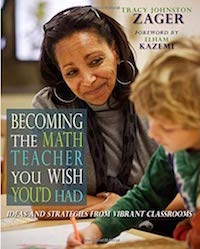
Becoming the Math Teacher You Wish You Had
Tracy ZagerThis book may be my new teaching Bible. Every chapter is full of case studies, practical examples, and research to get your math instruction on the right track. It’s all my other favorite books wrapped in one! Author Tracy Zager has also created a companion site with helpful tools and links to references in her book which is also worth checking out.
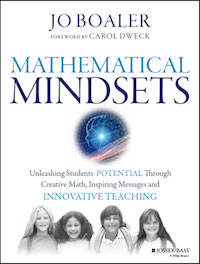
Mathematical Mindsets (or anything else Jo has written!)
Jo BoalerIf you haven't checked out Jo Boaler's work yet, stop everything and do it now. Such good stuff to be discovered! She has impacted me more than any other researcher in how I think about math learners. All the learners. Mathematical Mindsets offers the brain research behind how we learn mathematics, but it also gives us specific ideas to implement immediately in our schools and classrooms. Ideas that will help our students to become more flexible, confident, and successful in using their mathematical minds. Check out her books by clicking the link above. (While you're there, explore her site. You won't regret it!)
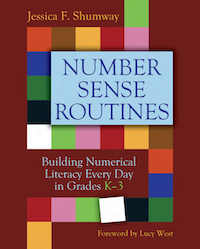
Number Sense Routines, Grades K-3, Building Numerical Literacy Every Day in Grades K-3
Jessica ShumwayIf there is one thing to do to boost conceptual understanding, mathematical flexibility, and reasoning skills for your students all at once, it’s to start using math routines at least three times a week. I promise you will see a visible difference in all of your learners, both in mathematical understanding and in mathematical confidence. Jessica Shumway uses her easy to read prose to outline specific routines to use in your classroom in a way that makes you feel like you are her friend by the end of the book and well-equips you for facilitating effective mathematical routines. She includes suggestions for lessons and also case examples from classrooms that are using the routines. There’s a lot of research behind this Utah State professor’s work, so I promise it’s a well vetted resource and one that you won’t regret implementing. And there’s a 3-5 version of the book, perfect for the upper elementary (and above) grades.
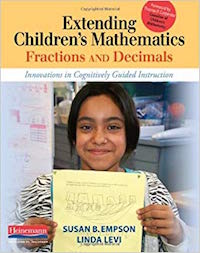
Extending Children’s Mathematics: Fractions and Decimals Innovations in Cognitively Guided Instruction
Susan B. Empson and Linda LeviThis is the sister book to another great read, Children’s Mathematics, Cognitively Guided Instruction (Carpenter, Fennema, Franke, Levi, and Empson). This book brilliantly helps readers to understand the progression of conceptual understanding needed to fully understand fractions and decimals. So if you’ve ever had students, children or adults, that struggle with these two concepts (that’s all of us, right?), this book is worth the read.
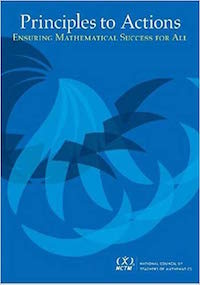
Principles to Actions, Ensuring Mathematical Success for All
National Council of Teachers of MathematicsYou may be familiar with the 8 Standards of Mathematical Practice that our students should be engaging in, but did you know that teachers also have 8 Mathematics Teaching Practices that we should be engaging in to be effective math teachers? Whether the answer to that question is yes or no, this book will help you to better understand these eight teaching practices as outlined by NCTM in order to boost your own mathematics instruction and/or support your mathematics teachers in becoming more effective. This one is an easy but powerful read. Note to coaches and administrators: Taking Action: Implementing Effective Mathematics Teaching Practices in Grades K-5 or the sister books for 6-8 and 9-12 are worth checking out. These books by DeAnn Huinker and Victoria Bill were released in 2017 as professional development companions to Principles to Actions and outline PD structures for you to use with your teachers.
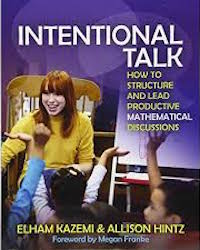
Intentional Talk: How to Structure and Lead Productive Mathematical Discussions
Elham Kazemi and Allison HintzWhen you begin trying to engage students in talking about their math ideas, it’s sometimes difficult to figure out exactly what to talk about! Intentional Talk helps you to navigate that discourse by describing 6 effective ways to facilitate discourse that is more about the relationships, concepts, and sometimes revealed misconceptions behind student understanding and less about math “show and share.” If you’re in a math talk rut, this one's for you.
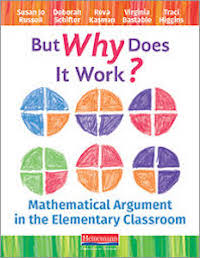
But Why Does it Work? Mathematical Argument in the Elementary Classroom
Susan Jo Russell, Deborah Schifter, Virginia Bastable, Traci Higgins, Reva KasmanThe five phases of mathematical argument that are outlined in this book through cases and links to video examples have really impacted the way I engage students in their mathematical reasoning. This book also helped me to value student ideas that are not yet fully formed and know what to do when those ideas come up in a discussion. The best part is that the authors included and appendix (and online bank) of easy to use sequences, organized by grade level and operation, to support you in trying out math argument in your class.
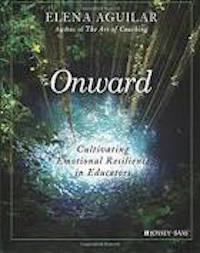
Onward: Cultivating Emotional Resilience in Educators
Elena AguilarOk. So this one is a recent read for me and I might decide to start passing it out on street corners because you don’t even need to be an educator to benefit from the wisdom of this one. It’s THAT good and applicable to life in general. The gist of the book is helping teachers (but again, this book applies to anyone!) build resiliency in order to be better teachers and happier humans. Each chapter focuses on a habit and how it builds resilience and it’s chock-full of practical ways to do hard things like chill out when the parent that likes to yell at you shows up, or balance time preparing for lessons with enjoying your favorite hobbies, or start eating well and finding time for meditation. Elena will easily convince why doing all of these things is not only important for you and your family, but also will benefit your students. There’s a workbook and that accompanies this book, and you can even find it on Audible. (Did I mention it’s THAT good??!) If you are an administrator, please buy this book for everyone on your staff. You will thank me for it.